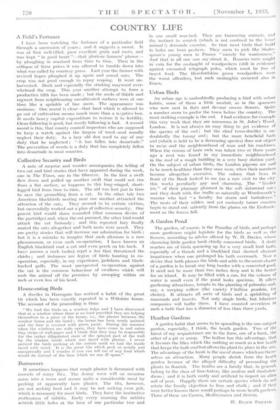COUNTRY LIFE
A Field's Fortunes I have been watching the fortunes of a particular field through a succession of years ; and it suggests a moral. It was at first well-tilled, grew excellent grain and roots, and was kept " in good heart "—that glorious farmers' phrase— by ploughing in mustard from time to time. Then in the collapse of farm prices it was allowed to tumble down into what was called by courtesy grass. Last year the farmer with ' revived hopes ploughed it up again and sowed oats. The crop was not good enough to repay reaping. It went un- harvested. Dock and especially the stinking mayweed over- whelmed the crop. This year another attempt to form a productive tilth has been made ; but the seeds of thistle and ragwort from neighbouring uncultivated surfaces were at one ' time like a sprinkle of fine snow. The appearance was ominous. One moral is clear—that land which is allowed to ' go out of cultivation means much more than a native loss. It needs heavy capital expenditure to restore it 'to fertility. Clean fallowing is good, but weedy fallowing is bad. A second . moral is this, that county council inspectors who are supposed to keep a watch against the largess of weed- seed usually
• neglect their duty. As a lazy old don used to say of any duty • that he neglected : " it has fallen into desuetude." The prevention of weeds is a duty that has completely fallen • into desuetude in most counties.


























































 Previous page
Previous page